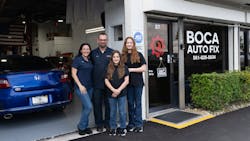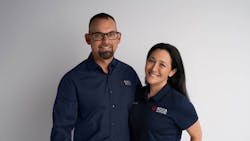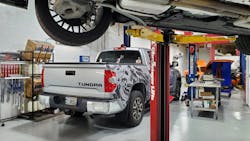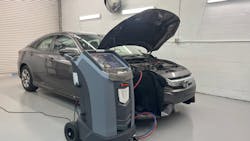Unlike many in the industry, Doug and Alissa DeLucca didn't come from the automotive world. In fact, Doug had built his career in corporate America in IT since the early 2000s. Recognizing it was time for a change, and after a short sabbatical, he decided to open an auto repair shop. While Doug had always been a hands-on mechanic with knowledge of American and Asian vehicles, what truly distinguishes Boca Auto Fix is the well-defined systems and procedures established from the start—many derived from Doug's previous experience in corporate America and the IT world.
Boca Auto Fix is located in Boca Raton, Florida, an area predominantly populated by high-end European vehicles. Doug and Alissa DeLucca started their shop just three years ago with the intention of entering a market they believed held opportunity. Boca Auto Fix services non-European vehicles and was founded on the premise of offering excellent customer service from day one, implementing systems and procedures that would ensure success from the beginning.
Getting the Marketing Right
When the DeLuccas opened the shop in 2022, D. DeLucca didn’t yet understand the importance of marketing. “You just can’t start a shop and expect the phone to start ringing,” says Doug. A short time after opening, he attended the Automotive Service and Tire Alliance Expo, where he learned new concepts on how to market his shop. With a lot of effort and time, Doug mastered SEO and other marketing tools so that he could handle Boca Auto Fix’s marketing push by himself.
“Of course, our website doesn't remain static. We continuously update it by adding new content, pictures, and various other elements to keep it fresh and engaging,” says Doug. It’s not uncommon for shops to think that just having a website will bring them the business they want.
With the addition of Alissa to the team, Boca Auto Fix gained manpower and, therefore, new ideas. The DeLucca family has always given back to the community, but it’s through their community involvement that they developed an entirely new customer base from their alma mater, Florida Atlantic University. Realizing that the campus is just a few miles away and has many out-of-state students, the need for auto care and repair was clear. Allisa contacted the parents' groups, many of whom help their children find everything from local doctors to services, and made Boca Auto Fix’s presence known. This involvement with the University has grown, and through a customer who is a marketing professor, the shop has become a class-marketing case study.
“We are now focusing on marketing to those potential customers who are close, a mile or two away, so that we keep the demand steady,” says Doug.
Forming Partnerships
The area in which the DeLuccas' shop is located has a large population of European cars. While Doug is not closed off to the idea of working on European makes, his area of expertise is in domestic and Japanese vehicles. “We partnered with a couple of shops that we hand off our European work to, and in exchange, they feed us their Asian domestic work. This arrangement has been working out very well,” says Doug.
The DeLuccas are well-established in the community and understand the value of forming strong relationships with all partners involved in their area. “We’re in a geographical location in which the shops are forced to be in certain industrial clusters, and some of them have been open for a long time,” says Alissa. This scenario makes competition not only service-based but also location-based. Allisa admits it wasn’t always an easy situation, but their mentality of becoming a staple of the community and not a “yes-shop,” has helped them make a name for themselves in the area.
Working on Cars is Different than Running a Business
One of the most common topics for discussion in our industry is working on the business versus working in the business. Owners are often bogged down by the day-to-day running of their shops, which prevents them from taking a step back and looking at the business from a different perspective. When shop owners are able to take the step toward working on the business, they can address new challenges like expansion, scaling, or becoming off-site owners.
Boca Auto Fix was designed from day one to have the potential to become a scalable business. “We have a good understanding of our KPIs. But how do our KPIs compare to industry standards? Are we beating them?” questions Doug. His prior experience in the corporate world has given him the expertise to implement systems and procedures that allow him to work on the business while serving as the main technician.
“There's been structure in the business since day one, and that's just going to help us scale,” says Doug.
The DeLuccas have always had an exit strategy in mind: a day in which they will be in the right place to pass their shop onto other hands and retire. “We want to be prepared well before that day comes. We're always working backwards, trying to see what the end of the tunnel looks like whenever we make any significant decisions for the business. This approach ensures we're consistently aligned with our long-term vision and exit strategy,” states Doug.
The Exit Strategy
According to the Harvard Business Review, the majority of startup exits happen through acquisition. Technology-based startups are often designed with the idea of building a business to sell, allowing a larger corporation to take the company to the next step. Auto repair shops are no different from other startups, but they tend to want to create a lasting legacy and expansion plan for the future. Most owners don’t have a detailed exit strategy at the start; rather, they develop one after operating for some time, often prompted by various circumstances, most likely as retirement age approaches.
Doug DeLucca has a different view, and his exit strategy was decided upon the creation of Boca Auto Fix. Having already developed a successful career in corporate America, DeLucca has a clear vision for when and how he wants to exit the auto repair business. The mindset of the exit strategy allows owners to make decisions based on the prospect of relinquishing their stake in ownership. It enables shop owners to define clear long-term goals and create business strategies and decisions focused on that exit plan, maximizing value creation.




